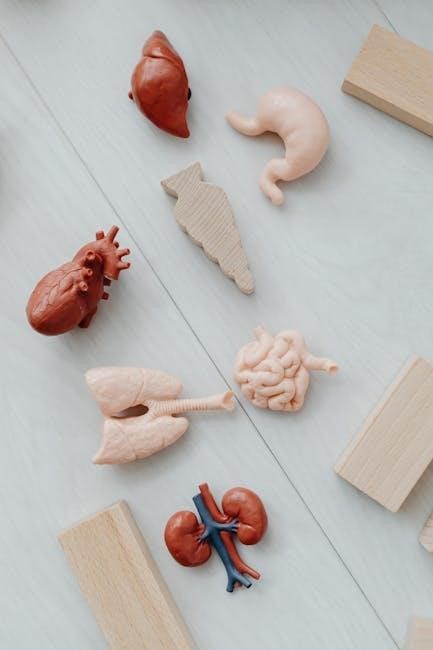TEAS Science Study Guide: Free PDF Resources
Preparing for the TEAS Science section can be daunting, but free PDF resources can significantly aid your study efforts. These resources offer accessible study guides, practice tests, and cheat sheets.
The Test of Essential Academic Skills (TEAS) is a standardized exam crucial for nursing school admissions. A significant portion of the TEAS assesses scientific knowledge. The science section covers a range of topics, including anatomy and physiology, biology, chemistry, and scientific reasoning. Preparing effectively for this section is essential to secure a competitive score. Many students find the science portion challenging, making dedicated study and targeted resources critical. Free PDF study guides, practice tests, and cheat sheets can provide a structured approach to mastering the necessary concepts. These resources offer a cost-effective way to enhance your understanding and improve your performance on the TEAS science section.
Importance of TEAS for Nursing School Admission
The TEAS exam is a critical component of the nursing school application process. It serves as a standardized measure of a candidate’s academic preparedness. Nursing schools use TEAS scores to evaluate applicants alongside GPA and other qualifications. A strong TEAS score can significantly enhance your chances of acceptance into a competitive nursing program; The exam assesses essential skills in reading, math, science, and English, indicating a student’s readiness for the rigorous nursing curriculum. Excelling in the science section demonstrates a solid understanding of fundamental concepts necessary for healthcare studies. Therefore, thorough preparation using resources such as free PDF study guides is highly recommended to achieve a competitive TEAS score.
Overview of the TEAS 7 Science Section
The TEAS 7 Science section assesses your knowledge in key scientific areas relevant to healthcare. It comprises 53 questions to be completed in 63 minutes, covering Anatomy and Physiology, Biology, Chemistry, and Scientific Reasoning. Anatomy and Physiology constitutes the largest portion, focusing on body systems and their functions. Biology questions explore fundamental biological principles, while Chemistry questions test knowledge of basic chemical concepts. Scientific Reasoning assesses your ability to analyze and interpret scientific data and draw conclusions. Effective preparation involves understanding the topics, practicing with sample questions, and utilizing resources like free PDF study guides. Mastering these areas is crucial for success on the TEAS 7 Science section.
Breakdown of Science Topics: Anatomy & Physiology
The Anatomy & Physiology portion of the TEAS Science section is substantial, requiring a solid understanding of the human body. Key topics include the integumentary, skeletal, muscular, nervous, endocrine, cardiovascular, lymphatic, respiratory, digestive, urinary, and reproductive systems. Focus on the structure and function of each system, as well as their interactions. Understand anatomical terminology, directional terms, and the physiological processes that maintain homeostasis. Study common diseases and disorders affecting each system. Utilize flashcards to memorize key terms and diagrams to visualize anatomical structures. Practice questions that require you to apply your knowledge to clinical scenarios. Mastery of these topics is crucial for success in this section.
Breakdown of Science Topics: Biology
The Biology section of the TEAS exam covers fundamental concepts essential for healthcare professionals. Key areas include cell structure and function, genetics, heredity, evolution, and ecology. Understand the different types of cells, their organelles, and their roles in cellular processes. Study Mendelian genetics, DNA replication, transcription, and translation. Familiarize yourself with the principles of natural selection and adaptation. Grasp ecological concepts such as food chains, food webs, and the interactions between organisms and their environment. Use diagrams to visualize complex processes, and practice applying biological principles to real-world scenarios. A strong foundation in biology is critical for understanding human health and disease.
Breakdown of Science Topics: Chemistry
The Chemistry section of the TEAS exam focuses on basic chemical principles relevant to healthcare. Topics include atomic structure, chemical bonding, chemical reactions, acids and bases, and states of matter. Master the basics of the periodic table, including element symbols, atomic numbers, and atomic weights. Learn about ionic, covalent, and metallic bonds. Understand different types of chemical reactions, such as synthesis, decomposition, and combustion. Know the properties of acids, bases, and pH. Familiarize yourself with the characteristics of solids, liquids, and gases. Practice balancing chemical equations and solving stoichiometry problems. A solid understanding of chemistry is crucial for comprehending physiological processes and medication actions.

Breakdown of Science Topics: Scientific Reasoning
The Scientific Reasoning section of the TEAS exam assesses your ability to apply scientific principles and interpret data. This involves understanding the scientific method, experimental design, and data analysis. Focus on identifying hypotheses, variables, and controls in experiments. Practice interpreting graphs, charts, and tables to draw conclusions. Learn to evaluate the validity of scientific claims and identify potential biases. Understand the difference between correlation and causation. Develop critical thinking skills to analyze experimental results and make inferences. Familiarize yourself with basic statistical concepts, such as mean, median, and mode. This section tests your ability to think critically and solve problems using scientific reasoning.

Free TEAS Practice Resources
Accessing free TEAS practice resources is essential for effective preparation. Utilize available practice tests and cheat sheets to enhance your understanding and improve your performance on the TEAS exam.
Free TEAS Practice Test PDF Downloads
To effectively prepare for the TEAS Science section, free practice test PDF downloads are invaluable tools. These resources provide a realistic simulation of the actual exam, allowing you to assess your knowledge and identify areas for improvement. By utilizing these practice tests, you can familiarize yourself with the format, content, and timing of the TEAS exam.
These free resources will help you to simulate exam conditions. Additionally, they offer a convenient and accessible way to study at your own pace. Incorporate these practice tests into your study plan to maximize your chances of success.
Where to Find Free Practice Tests

Locating free TEAS practice tests can be straightforward with the right resources. Many educational websites and test preparation companies offer complimentary practice tests in PDF format. Some popular options include searching official ATI TEAS study guides, which often contain sample questions.
Nursing schools and community colleges may also provide free resources on their websites or in their libraries. Ensure the practice tests cover all sections of the TEAS, including Science, Math, Reading, and English. Always verify the credibility and recency of the source to ensure the practice tests align with the latest TEAS format and content.
Benefits of Using Practice Tests
Utilizing TEAS practice tests offers numerous advantages for exam preparation. These tests help you gauge your current knowledge level across all subjects, allowing you to identify strengths and weaknesses. Regular practice improves familiarity with the test format, question types, and time constraints.
Practice tests also build confidence, reducing anxiety on test day. By simulating the actual exam environment, you can refine your test-taking strategies and improve your pacing. Analyzing your performance on practice tests helps you pinpoint areas needing more focus; This targeted approach ensures efficient and effective study habits, maximizing your chances of success on the TEAS.
Identifying Weak Areas
One of the most significant benefits of using TEAS practice tests is the ability to pinpoint your weak areas. By analyzing your performance on these tests, you can determine which science topics require more attention. This targeted approach allows you to focus your study efforts on the areas where you need the most improvement.
Reviewing the questions you answered incorrectly, along with their explanations, provides valuable insights into the concepts you need to revisit. Recognizing these weak areas early in your preparation enables you to allocate your study time more effectively. By concentrating on these areas, you can strengthen your overall understanding and improve your TEAS score.
Familiarizing Yourself with the Format
Taking free TEAS practice tests is crucial for familiarizing yourself with the exam’s format. The TEAS exam has a specific structure, question types, and time constraints. By working through practice tests, you become comfortable with the layout and the way questions are presented. This familiarity reduces anxiety on test day, allowing you to focus on answering questions accurately.
Practice tests simulate the actual testing environment, helping you get used to the pacing required to complete each section within the allotted time. Understanding the format beforehand allows you to approach the exam with confidence and manage your time efficiently, increasing your chances of success.
Free TEAS Cheat Sheets PDF Downloads
Free TEAS cheat sheets in PDF format are invaluable tools for efficient exam preparation. These concise resources summarize key concepts, formulas, and definitions across all TEAS subjects, including science. By downloading these cheat sheets, you gain quick access to essential information, making them perfect for on-the-go studying.
Cheat sheets condense large amounts of material into easily digestible formats, highlighting the most important facts and principles you need to know. They serve as excellent revision aids, helping you reinforce your understanding of core topics and quickly recall information during practice tests or the actual exam. They are especially useful for last-minute reviews.
Content Covered in Cheat Sheets
TEAS cheat sheets comprehensively cover key science topics, ensuring you have a concise reference guide. In anatomy and physiology, expect summaries of organ systems, anatomical terms, and physiological processes. Biology cheat sheets include cell structure, genetics, and basic ecological principles.
Chemistry cheat sheets offer a review of chemical reactions, the periodic table, and common compounds. Scientific reasoning cheat sheets cover experimental design, data interpretation, and the scientific method. These resources provide essential information for quick review, making them a valuable asset in your TEAS preparation. They help reinforce your understanding;
How to Use Cheat Sheets Effectively
Cheat sheets are most effective when used as a review tool after initial study. Start by thoroughly studying each TEAS science topic. Then, use the cheat sheets to reinforce your knowledge and identify weak areas. Regularly review the cheat sheets, focusing on the concepts you find challenging.
Use them for quick refreshers before practice tests or study sessions. Integrate cheat sheets into your study routine by quizzing yourself on the content. By actively engaging with the material, you will improve retention and perform better on the TEAS exam. They serve as excellent memory aids.

Study Guide Content and Strategies
Effective TEAS preparation involves targeted content review and strategic study techniques. Focus on key science topics and utilize methods like flashcards and online resources to maximize learning and retention.
Key Topics to Focus on for the Science Section
To excel in the TEAS Science section, prioritize key topics within anatomy and physiology, biology, chemistry, and scientific reasoning. For anatomy and physiology, concentrate on organ systems and their functions. In biology, focus on cellular processes and genetics. Chemistry requires a grasp of basic concepts and reactions. Scientific reasoning involves analyzing data and drawing logical conclusions.
Mastering these areas through targeted study and practice will greatly enhance your performance. Remember to utilize available free PDF resources for focused preparation and review.
Human Anatomy & Physiology Study Strategies
For the Anatomy & Physiology portion of the TEAS, focus on understanding the major organ systems: skeletal, muscular, nervous, endocrine, cardiovascular, respiratory, digestive, urinary, and reproductive. Learn the structure, function, and interactions of each system. Use diagrams and models to visualize anatomical structures. Practice questions that test your ability to apply knowledge to clinical scenarios.
Break down complex processes into manageable steps. Utilize flashcards for memorizing key terms and anatomical locations. Consider online resources for interactive learning and visual aids to reinforce your understanding of human anatomy and physiology.
Biology Study Strategies
When studying biology for the TEAS, concentrate on essential topics like cell structure, genetics, evolution, and ecology. Understand the functions of cellular organelles and the processes of cell division (mitosis and meiosis). Focus on Mendelian genetics and inheritance patterns. Grasp the basics of natural selection and adaptation.
Review ecological concepts such as food chains, food webs, and ecosystems. Practice applying biological principles to real-world scenarios. Use visual aids like diagrams and flowcharts to clarify complex processes. Create flashcards for key terms and definitions to enhance memorization.
Chemistry Study Strategies
To tackle the chemistry section of the TEAS effectively, prioritize understanding basic concepts such as atomic structure, chemical bonding, and the periodic table. Learn how to balance chemical equations and identify different types of chemical reactions (e.g., synthesis, decomposition). Grasp the properties of acids, bases, and pH.
Familiarize yourself with common chemical compounds and their formulas. Practice solving stoichiometry problems, including mole calculations and limiting reactants. Use practice questions to reinforce your understanding. Review laboratory safety procedures and common lab equipment. Focus on key concepts for exam success.
Scientific Reasoning Study Strategies
Mastering scientific reasoning on the TEAS requires understanding the scientific method: observation, hypothesis formation, experimentation, and conclusion. Practice interpreting data presented in graphs, charts, and tables. Develop skills in identifying independent and dependent variables, controls, and potential sources of error in experiments.
Learn to draw logical conclusions based on experimental results and distinguish between correlation and causation. Review experimental design principles to evaluate the validity of research studies. Focus on questions that require critical thinking and problem-solving using scientific principles. Use practice tests to hone your skills.
Effective Study Techniques

To excel in the TEAS Science section, adopt a multifaceted approach to studying. Combine visual aids, such as diagrams and videos, with textbook reading to reinforce concepts. Create a realistic study schedule, allocating specific time slots for each subject area. Regularly review previously learned material to strengthen retention.
Practice active recall by summarizing information without referring to your notes. Engage in group study sessions to discuss challenging topics and learn from peers. Utilize online quizzes and interactive simulations to test your knowledge and identify areas needing further review. Ensure you get enough rest and maintain a healthy lifestyle.
Flashcard Usage for Key Terms and Formulas

Flashcards are invaluable for memorizing key terms and formulas in the TEAS Science section. Create flashcards for each science topic, including definitions, concepts, and equations. On one side, write the term or concept, and on the other side, provide a concise definition or explanation;
Regularly review your flashcards, focusing on those you find challenging. Use spaced repetition, gradually increasing the intervals between reviews. Organize flashcards by topic to streamline your study sessions. Carry flashcards with you to utilize spare moments for quick reviews. Consider using digital flashcard apps for added convenience and features.
Utilizing Online Resources and Video Lessons
Online resources and video lessons offer a dynamic way to supplement your TEAS Science preparation. Explore reputable websites and platforms that provide comprehensive study materials, practice questions, and interactive tutorials. Video lessons can be particularly helpful for understanding complex concepts and processes.
Look for channels that align with the TEAS Science content areas, such as anatomy and physiology, biology, chemistry, and scientific reasoning. Use these resources to reinforce your understanding, clarify doubts, and gain different perspectives on challenging topics. Supplement textbook study with visual and auditory learning for comprehensive preparation.

Additional Resources and Information
To further enhance your TEAS Science preparation, consider exploring various study guides, preparation tips, and updates regarding the TEAS exam. Staying informed ensures a focused and effective study approach.
Overview of Available TEAS Study Guides (Including PDF Options)
Numerous TEAS study guides are available to assist in your preparation, many of which offer PDF versions for easy access. These guides cover all sections of the TEAS exam, including science, and often provide detailed explanations, practice questions, and strategies.
Some popular options include official ATI TEAS study manuals, which are comprehensive and aligned with the exam content. Additionally, third-party publishers offer study guides tailored to different learning styles. Look for guides that provide diagnostic tests to identify weak areas and focus your studying effectively. Ensure the chosen guide includes updated content reflecting the latest TEAS version.
Tips for Preparing for the TEAS Exam
Effective preparation for the TEAS exam involves a strategic approach that incorporates various study techniques. Start by understanding the exam format and content areas, focusing on your weaker subjects. Utilize a combination of study guides, practice tests, and cheat sheets to reinforce your knowledge.
Create a study schedule that allocates sufficient time for each section, and stick to it consistently. Practice time management by simulating exam conditions. Review key concepts regularly and seek help when needed. Maintain a healthy lifestyle with adequate sleep and nutrition to optimize your cognitive function. Finally, stay confident and believe in your abilities to succeed.
Understanding TEAS Test Changes and Updates
Staying informed about TEAS test changes and updates is crucial for effective preparation. The TEAS exam undergoes revisions periodically, typically every few years, to reflect current educational standards and healthcare practices. These updates may include new content areas, revised question types, or changes to the exam format.
Keep an eye on the official ATI website for announcements regarding any updates. Review the latest TEAS study guide and practice materials to familiarize yourself with the changes. Adapting your study plan to incorporate new content ensures you are well-prepared for the most current version of the exam, maximizing your chances of success.
Frequency of TEAS Exam Updates
The TEAS exam is not static; it evolves to maintain its relevance and effectiveness in assessing the skills necessary for aspiring nurses. Historically, the TEAS exam undergoes updates approximately every five years. These updates ensure the exam content aligns with current nursing education standards and reflects changes in healthcare practices.
The most recent version, TEAS 7, was released in June 2022, introducing new question types and content areas. Keeping track of these updates is essential for effective preparation. Always refer to the official ATI website for the most accurate information regarding exam changes and ensure your study materials are up-to-date.

Importance of Preparing for the ATI TEAS Exam

Preparing for the ATI TEAS exam is not merely about passing a test; it is a crucial step toward securing admission into a nursing program. A strong TEAS score demonstrates your readiness for the rigorous academic demands of nursing school, showcasing your foundational knowledge in key areas like science, math, reading, and English.
Moreover, a well-prepared student approaches the exam with confidence, reducing test anxiety and increasing the likelihood of achieving a competitive score. Investing time and effort into TEAS preparation significantly enhances your application and sets the stage for success in your nursing career. Thorough preparation truly makes a difference.
